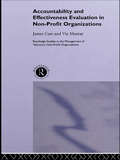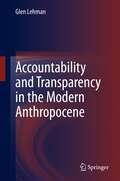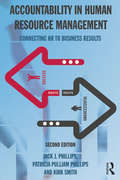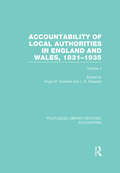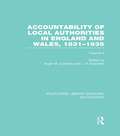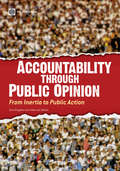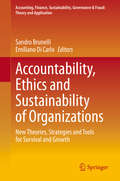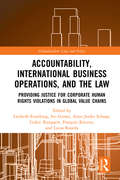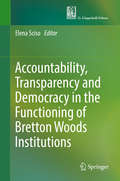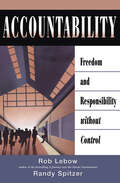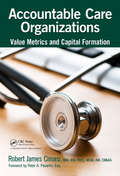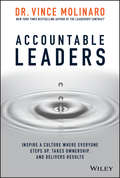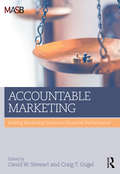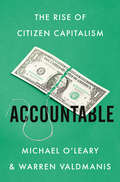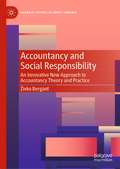- Table View
- List View
Accountability and Effectiveness Evaluation in Nonprofit Organizations (Routledge Studies In The Management Of Voluntary And Non-profit Organizations Ser. #Vol. 4)
by James Cutt Vic MurrayThis unique volume provides new perspectives on assessing the performance of nonprofit organizations whilst meeting the information needs of decision-makers, both internal (such as resource-providers, regulators and clients), and external (including boards, managers, staff and volunteers).Whilst most discussions of accountability focus exclusively
Accountability and Regulatory Governance
by Andrea C. Bianculli Xavier Fern�ndez-i-Mar�n Jacint JordanaThis collection improves our understanding of the problems associated to accountability in regulatory governance, focusing on audiences, controls and responsibilities in the politics of regulation and through a systematic exploration of the various mechanisms through which accountability in regulatory governance
Accountability and Transparency in the Modern Anthropocene
by Glen LehmanThe book is about accountability processes and how they contribute solutions to our current environmental and global political problems. This book is different to other literature in this field. This is so because the dominant accountability discourse is shaped by what is defined as a neoliberal business case for social and environmental reform. This book assumes a nirvana stance within globalisation where all citizens operate within the parameters of the free market and will recover from adverse economic and political damage. Further this book uses neoliberalism and free-market reforms aims as examples to implement efficient management technologies and create more competitive pressures. Central to the argument of the book are perspectives on authenticity, expressivism and interpretivism which are found to provide a radical reworking of our understanding of being in the world. These frameworks offer a starting point for rethinking the way individuals, businesses and communities ought to be dealing politically with accountability and ecological crises. The argument builds to an accountability perspective that utilises work from expressivism, interpretivism, classical liberalism and postmodern theory. The theoretical quest undertaken in this book is to develop connections between accountability, democratic, ethical and ecological perspectives.
Accountability in Human Resource Management: Connecting HR to Business Results (Improving Human Performance Ser.)
by Jack J. Phillips Patricia Pulliam Phillips Kirk SmithFrom selection and assessment, to training and development, and reward management, all HR functions have an impact on an organization. Ever-present budgetary pressures mean that there is perpetual competition for resources, so HR departments must be able to account for and justify their contribution to the bottom line. This practical text presents a results-based approach to HR accountability, which explains how to: Uncover and monitor the costs of HR programs Develop programs emphasizing accountability Collect data for evaluation Measure the contribution of human resources Calculate HR’s return on investment This new edition is fully revised and updated to reflect developments in the field, such as the rise of talent management and the increased role of technology in HR measurement, and is supported with international examples throughout. New chapters have been added to address business alignment, HR scorecards, analytics maturity, and international applications of the methodology. Case studies, tool templates and lecture slides are provided as online supplements for HR practitioners and students. Accountability in Human Resource Management 2nd Edition is a complete and detailed guide suitable for HR professionals and students on advanced human resource management courses.
Accountability in Public Policy Partnerships
by Julia SteetsA PDF version of this book is available for free in open access via the OAPEN Library platform, www. oapen. org . This book presents a new model of accountability which ensures that public-private partnerships don't erode public accountability. It defines concrete accountability standards for different types of partnerships.
Accountability of Local Authorities in England and Wales, 1831-1935 Volume 1 (Routledge Library Editions: Accounting)
by Hugh M. Coombs J. R. EdwardsThese books make available material relating to the statutory regulations covering the degree of accountability required from local authorities during the period 1834-1936. The bulk of historical accounting research has focused on the development of financial accounting although in recent years the development of management accounting has attracted more interest. In both these areas, it has been the accounting practices of the private sector which have received more attention, central government in the Middle Ages some attention, and local government accounting very little. These volumes redress this imbalance in historical investigation, both to provide a comparative basis for work on the private sector and to provide an historical perspective for the system of local government accounting currently in use.
Accountability of Local Authorities in England and Wales, 1831-1935 Volume 2 (Routledge Library Editions: Accounting)
by Hugh M. Coombs J. R. EdwardsThese books make available material relating to the statutory regulations covering the degree of accountability required from local authorities during the period 1834-1936. The bulk of historical accounting research has focused on the development of financial accounting although in recent years the development of management accounting has attracted more interest. In both these areas, it has been the accounting practices of the private sector which have received more attention, central government in the Middle Ages some attention, and local government accounting very little. These volumes redress this imbalance in historical investigation, both to provide a comparative basis for work on the private sector and to provide an historical perspective for the system of local government accounting currently in use.
Accountability through Public Opinion
by Taeku Lee Sina Odugbemi"Accountability" has become a buzzword in international development. Development actors appear to delight in announcing their intention to "promote accountability"-but it is often unclear what accountability is and how it can be promoted. This book addresses some questions that are crucial to understanding accountability and for understanding why accountability is important to improve the effectiveness of development aid. We ask: What does it mean to make governments accountable to their citizens? How do you do that? How do you create genuine demand for accountability among citizens, how do you move citizens from inertia to public action? The main argument of this book is that accountability is a matter of public opinion. Governments will only be accountable if there are incentives for them to do so-and only an active and critical public will change the incentives of government officials to make them responsive to citizens' demands. Accountability without public opinion is a technocratic, but not an effective solution. In this book, more than 30 accountability practitioners and thinkers discuss the concept and its structural conditions; the relationship between accountability, information, and the media; the role of deliberation to promote accountability; and mechanisms and tools to mobilize public opinion. A number of case studies from around the world illustrate the main argument of the book: Public opinion matters and an active and critical public is the surest means to achieve accountability that will benefit the citizens in developing countries. This book is designed for policy-makers and governance specialists working within the international development community, national governments, grassroots organizations, activists, and scholars engaged in understanding the interaction between accountability and public opinion and their role for increasing the impact of international development interventions.
Accountability, Ethics and Sustainability of Organizations: New Theories, Strategies and Tools for Survival and Growth (Accounting, Finance, Sustainability, Governance & Fraud: Theory and Application)
by Sandro Brunelli Emiliano Di CarloThis book explains how the traditional paradigm of private and public organizations is changing as a result of the multiple factors that are affecting the way in which goods and services are produced, and for whom they are produced. In view of these disruptive trends, the theory of the firm needs to be updated and to some extent rethought. Moreover, diverse challenges and opportunities such as climate change, aging populations, and new public accountability requirements are necessitating novel frameworks to ensure the long-term survival of public and private organizations. Against this backdrop, the authors contribute to the debate over the firm’s primary interest by proposing a new way of viewing the nature of the firm and its relationship with stakeholders. In addition, they carefully analyze the challenges and opportunities mentioned above, evaluating their significance for various important aspects of organizations through different lenses. Global in scope, the book also takes the United Nations Sustainability Development Goals into account. Accordingly, it will be of interest to all readers seeking a better understanding of the evolving nature of firms and organizations in our changing world.
Accountability, International Business Operations and the Law: Providing Justice for Corporate Human Rights Violations in Global Value Chains (Globalization: Law and Policy)
by Cedric Ryngaert Liesbeth Enneking Ivo Giesen Anne-Jetske Schaap François Kristen Lucas RoordaA consensus has emerged that corporations have societal and environmental responsibilities when operating transnationally. However, how exactly corporations can be held legally accountable for their transgressions, if at all, is less clear. This volume inquires how regulatory tools stemming from international law, public law, and private law may or may not be used for transnational corporate accountability purposes. Attention is devoted to applicable standards of liability, institutional and jurisdictional issues, and practical challenges, with a focus on ways to improve the existing legal status quo. In addition, there is consideration of the extent to which non-legal regulatory instruments may complement or provide more viable alternatives to these legal mechanisms. The book combines legaldoctrinal approaches with comparative, interdisciplinary, and policy insights with the dual aim of furthering the legal scholarly debate on these issues and enabling higher quality decision-making by policymakers seeking to implement regulatory measures that enhance corporate accountability in this context. Through its study of contemporary developments in legislation and case law, it provides a timely and important contribution to the scholarly and sociopolitical debate in the fastevolving field of international corporate social responsibility and accountability.
Accountability, Philosophy and the Natural Environment (Routledge Research in Sustainability and Business)
by Glen LehmanUsing a philosophical and interdisciplinary approach, this book looks at how accountability can provide solutions to our current environmental and global political problems. When a social system has external elements imposed upon it, or presented to it, political problems are likely to emerge. This book demonstrates that what is needed are connecting social elements with a natural affinity to bring people together despite their differences. This book is different from others in the field. It provides new insights by critiquing the extant understandings of accountability and expands the possibilities by building on Charles Taylor’s philosophies. Central to the argument of the book are perspectives on authenticity and expressivism which are found to provide a radical reworking of our understanding of being in the world, and a starting point for rethinking the way individuals and communities ought to be dealing politically with accountability and ecological crises. The argument builds to an accountability perspective that utilises work from interpretivism, liberalism, and postmodern theory. The book will be of interest to researchers in environmental philosophy, critical perspectives on accounting, corporate governance, corporate social reporting, and environmental accounting.
Accountability, Transparency and Democracy in the Functioning of Bretton Woods Institutions
by Elena ScisoThis book investigates the strengths and weaknesses - in terms of transparency and compliance with the democratic principle - of Bretton Woods Institutions, considering the most important innovations from the original framework achieved through the introduction of independent accountability and complaint mechanisms (the Inspection Panel and Independent Evaluation Office), but also due to relevant reforms in the internal governance of the International Monetary Fund and the new financial assistance tools. One of its main focuses is on evaluating the socio-economic impact of conditionality in the countries requiring financial assistance, acknowledging the need to strengthen social protection policies in the adjustment programs. In addition, emphasis is given to the effects of the "constitutionalization" of the Washington Consensus in the European Union, with the establishment of the so-called "Berlin-Brussels-Frankfurt Consensus. "
Accountability: Freedom and Responsibility Without Control
by Randy Spitzer Robert LebowUsing a wealth of real-world examples, this breakthrough book offers a new freedom-based management paradigm that radically improves every aspect of business-from how we hire, compensate, and motivate people to how we address quality issues, serve customers, review employees, and more. Accountability tells the story of Pete Williams, a hard-charging CEO, who meets Stan "Kip" Kiplinger, a retired businessman, during a cross-country train trip. Pete's manufacturing business is in critical condition; productivity is falling. He's tried all the popular management approaches, but he can't get his people to be accountable for meeting their goals. Kip points out that every management system Pete has used is ultimately based on controlling people. Rather than encouraging people to be accountable, control-based systems discourage accountability by destroying people's sense of ownership of their job. Kip introduces Pete to a new way of leading people based on freedom-giving people the freedom to make their own choices and to do it their way. This doesn't mean anarchy; it means leadership expects everyone to act like an adult and take responsibility for his or her actions and their outcomes. Accountability details how this new approach yields a consistent flow of creative innovations and organizational improvements impossible under the old, coercive systems.
Accountable Care Organizations: Value Metrics and Capital Formation
by Robert James CimasiAn accountable care organization (ACO) is a healthcare organization characterized by a payment and care delivery model that seeks to tie provider reimbursements to quality metrics and reductions in the total cost of care for an assigned group of patients. Accountable Care Organizations: Value Metrics and Capital Formation explores the historical ba
Accountable Leaders: Inspire a Culture Where Everyone Steps Up, Takes Ownership, and Delivers Results
by Vince MolinaroProven methods to push your organization to its maximum potential with responsible leadership Accountable Leaders is the real-world guide to propelling your business to extraordinary levels of performance and achievement. Leadership accountability is a major issue in organizations around the globe. Research has shown that teams and individual employees are overwhelmingly dissatisfied with the degree of accountability demonstrated by their leaders. Effective teams need responsible and accountable leaders—the solution seems simple. Yet, thousands of businesses are struggling with mediocre performance and widening gaps in leadership. This essential resource provides practical and no-nonsense strategies to transform any organization into a cohesive, highly motivated culture of accountable leaders and fully committed teams. Bestselling author Dr. Vince Molinaro shares his proven methods of optimal leadership accountability, providing a step-by-step blueprint for leaders in any organization. Developed from years of experience helping Fortune 500 companies build strong leaders and effective teams, this book will enable you to: Build strong leadership accountability to leverage competitive advantage, increase team performance, and close the leadership gap in your organization Understand why gaps in leadership occur and recognize accountability issues in your own organization Develop an effective strategy to instill a culture of accountability and responsibility in your business Identify and implement organizational practices that encourage accountable leadership throughout your management structure Accountable Leaders is a vital guide for anyone who leads a team: from managers and supervisors, to CEOs and CHROs. This invaluable guide will provide the tools and knowledge to take you and your organization to incredible levels of performance and achievement.
Accountable Marketing
by Wendy BoldAccountable Marketing presents a do-able marketing model for smaller accounting and financial advice practices and partnerships that appreciate substance over spin. It outlines both the why and the how of implementing just 5 key resources and a 4-step strategy designed to increase awareness and generate enquiry amongst the type of Clients you most want to do business with. It won’t steal your time. It’s affordable. It’s measurable and it makes sense. It’s Accountable Marketing!
Accountable Marketing: Linking marketing actions to financial performance
by David W Stewart Craig T. GugelAccountable Marketing is designed to be the definitive volume on the emerging role of accountability and performance metrics in marketing. Sponsored and developed by the Marketing Accountability Standards Board (MASB), it provides a multi-disciplinary, international perspective on this topic of critical importance. Stewart and Gugel have curated the work of several leading marketing, finance and accounting professionals and academics on the topics of marketing accountability and financial reporting to create a volume that represents the best of MASB’s work over the last few years. The book not only emphasizes the importance of accountability in the marketing function, but also creates a dialogue among academics and practitioners about the importance of marketing in driving consistent growth in the organization, and the ways in which improved methods for measuring and forecasting contribute to the effectiveness of these marketing activities. This book marks the first-ever reference point for practicing professionals, faculty and students interested in marketing accountability, the development of standards for marketing reporting, and developing stronger linkages between marketing activities and outcomes, and the financial performance of the firm.
Accountable: The Baylor Scott & White Quality Alliance Accountable Care Journey
by Briget Da Graca Kathleen M. Richter Jean SullivanWhile many health care organizations need to improve health care quality and lower costs, most lack specific strategies and tactics for implementing these changes. Baylor Scott & White Health has established and continues to develop an accountable care organization (ACO) called the Baylor Scott & White Quality Alliance (BSWQA) to improve th
Accountable: The Rise of Citizen Capitalism
by Michael O'Leary Warren Valdmanis“More than ever before, this is the book our economy needs.” – Dr. Rajiv Shah, president of the Rockefeller Foundation“Unwilling to settle for easy answers or superficial changes, O’Leary and Valdmanis push us all to ask more of our economic system.” – Senator Michael F. BennetThis provocative book takes us inside the fight to save capitalism from itself.Corporations are broken, reflecting no purpose deeper than profit. But the tools we are relying on to fix them—corporate social responsibility, divestment, impact investing, and government control—risk making our problems worse.With lively storytelling and careful analysis, O’Leary and Valdmanis cut through the tired dogma of current economic thinking to reveal a hopeful truth: If we can make our corporations accountable to a deeper purpose, we can make capitalism both prosperous and good.What happens when the sustainability-driven CEO of Unilever takes on the efficiency-obsessed Warren Buffett? Does Kellogg’s—a company founded to serve a healthy breakfast—have a sacred duty to sell sugary cereal if that’s what maximizes profit? For decades, government has tried to curb CEO pay but failed. Why? Can Harvard students force the university to divest from oil and gas? Does it even matter if they do?O’Leary and Valdmanis, two iconoclastic investors, take us on a fast-paced insider’s journey that will change the way we look at corporations. Likely to spark controversy among cynics and dreamers alike, this book is essential reading for anyone with a stake in reforming capitalism—which means all of us.
Accountancy 11th Standard - Tamilnadu Board
by Training State Council of Educational ResearchAccountancy Textbook for the 11th Standard Students, preparing for Tamil Nadu State Board Exam.
Accountancy Volume-1 12th Standard - Tamilnadu Board
by Training State Council of Educational ResearchAccountancy Textbook Volume-1 for the 12th Standard Students, preparing for Tamil Nadu State Board Exam.
Accountancy Volume-2 12th Standard - Tamilnadu Board
by Training State Council of Educational ResearchAccountancy Textbook Volume-2 for the 12th Standard Students, preparing for Tamil Nadu State Board Exam.
Accountancy and Empire: The British Legacy of Professional Organization (Routledge New Works in Accounting History)
by Chris PoullaosThis book brings together, for the first time, studies of the professionalisation of accountancy in key constituent territories of the British Empire. The late nineteenth century was a period of intensive activity in terms of both imperialism and professionalisation. A team of expert contributors has examined profession-state engagements between Britain, on the one hand and Canada, South Africa, Australia, Nigeria, Malaysia, Sri Lanka, Jamaica, Trinidad and Tobago, India and Kenya, and the other with a view to assessing how the organizations of accountancy in the colonies was affecting the metropolitan profession and state agents- and vice versa. Their contributions highlight the peculiarities of the professionalization processes in variant social, economic and political environments linked together by the relays of empire, prompting reflection on both the common and disparate dynamics involved. This book has numerous objectives, including giving historical insight and focus on countries that provide contrasting and variant examples of the uptake of the "British model", and broadening the appeal of accounting history and professionalisation as a taught subject in university accounting departments.
Accountancy and Social Responsibility: An Innovative New Approach to Accountancy Theory and Practice (Palgrave Studies in Impact Finance)
by Živko BergantAccountancy encompasses much more than is normally considered, especially from a social responsibility point of view. This book brings fresh ideas and an innovative approach to accountancy theory and practice as well as critical views about professional thinking in accountancy. The reader will find advanced approaches regarding usiness objectives with social responsibility principles. A new role of accountancy is founded for a sustainable society. The responsibility of individuals is emphasized through behavioural analysis. The book has an interdisciplinary character and will be interesting for students, doctoral students, academics and practitioners as well. The real thread of the book is the risk and responses to the feelings of risk in organizations and also of individuals. On this basis a new role and a new structure of accountancy is offered.
Accountancy: Financial Accounting Part-1 class 11 - NCERT - 23
by National Council of Educational Research and TrainingThe NCERT class 11 Accountancy Part 1 textbook provides a comprehensive introduction to accounting principles and practices. It covers topics such as the theory base of accounting, recording business transactions, preparation of financial statements, and bank reconciliation. Students will gain a strong foundation in financial accounting, essential for understanding a company's financial health and reporting. The book aims to develop students' proficiency in recording and analyzing financial data, preparing financial statements, and comprehending the significance of accounting principles in business operations.
